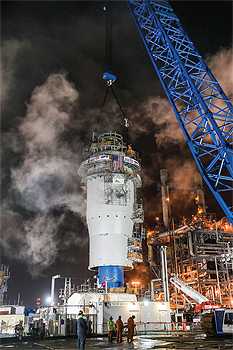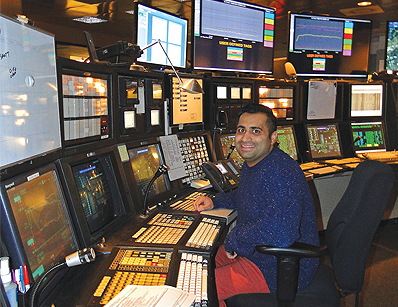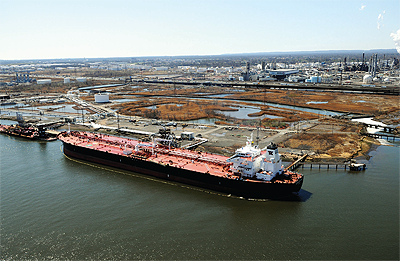The Bayway Refinery
Raising the benchmark
Located on the New York Harbour in New Jersey, The Bayway Refinery is one of the most significant facilities on the US east coast and a jewel in the crown of the refining operations of its parent company Phillips 66. With a history stretching back over a century, the site has witnessed not just several changes of ownership over the decades, but also significant evolutions in technology and processes.
Energy, Oil & Gas was privileged to be able to speak to Mike Bukowski, the Refinery Manager at Bayway, to really get an insight into the changes that have been underway at the facility. He began  with some background information about its operational capabilities and the fuels produced there. “By being situated right on the New York harbour, outside of New York City, the refinery is well positioned to take advantage of one of the largest, if not the largest petroleum market in the world,” he began. “We are a relatively big facility, with a crude capacity of 240,000 barrels a day, and a total processed input capacity of 300,000 barrels per day, which includes other types of auxiliary inputs like Fluid Catalytic Cracking Unit (FCC) feed. We primarily make gasoline, jet fuel, ultra-low sulphur diesel, propane and some butane, plus polypropylene, which is sold as a plastic.
with some background information about its operational capabilities and the fuels produced there. “By being situated right on the New York harbour, outside of New York City, the refinery is well positioned to take advantage of one of the largest, if not the largest petroleum market in the world,” he began. “We are a relatively big facility, with a crude capacity of 240,000 barrels a day, and a total processed input capacity of 300,000 barrels per day, which includes other types of auxiliary inputs like Fluid Catalytic Cracking Unit (FCC) feed. We primarily make gasoline, jet fuel, ultra-low sulphur diesel, propane and some butane, plus polypropylene, which is sold as a plastic.
“We are also now finishing up a project that will put us in a position to make marine fuels that adhere to the new International Maritime Organization’s (IMO) ultra-low sulphur specifications due to come into place in 2020. There is currently a lot of speculation in the market about how ship operators will deal with the new regulations, but ultimately, we may see that the new IMO compliant fuel will be an important product for us. Operators also have the option to retrofit scrubbers to their vessels, but that is capital intensive and takes time. They could also use ultra-low sulphur diesel to blend into heavy fuel oil to meet the specification, but that creates another opportunity for us, as we also make that diesel.”
Feat of engineering
Mike noted that Bayway’s location on the harbour means that it is able to receive most of its crude via water borne transportation, plus it receives crude from the Bakken field via rail. “Having the ability to bring in crude from Bakken, especially now in a timeframe where that material is advantageously priced, gives us a little bit of flexibility, versus some of the crudes that we get from Canada or West Africa,” Mike noted. “We are always looking for the best opportunity crude, and keep an open mind on where we are sourcing it, given the specifications and abilities of our refinery.”
Having mentioned the refinery’s capabilities, Mike pointed out that Bayway operates the largest Fluid Catalytic Cracking Unit (FCC) in the western hemisphere, which was originally built in the late 1940s. Understandably, the equipment in this area has advanced significantly, and therefore to increase its yields, Phillips 66 initiated a modernisation project around the FCC, which included the replacement of the 850-ton reactor with state-of-the-art technology. This project was completed in 2018, and Mike noted that not only was this an exciting time for Bayway, but the success of what was a mammoth undertaking is a source of pride for both him and the entire refinery team. It wasn’t without its challenges of course. “The FCC is a very significant piece of the refinery, and so the biggest test was to minimise downtime, and install the new unit while remaining operational. We fabricated the new reactor off site, had it shipped here in pieces, then put them together on site, which required extraordinary workmanship. We used one of the world’s largest mobile cranes to remove the old reactor in one piece, and popped the new one into its place,” Mike commented. It may sound simple, but this was an amazing feat of engineering, with the crane requiring seven million pounds of counterweight, according to The International Brotherhood of Boilermakers.
Focus on safety
Such has been the success of Bayway’s FCC upgrade that processes within the reactor which previously took around 17 seconds, now take less than two, vastly improving the selectivity of its yield slate. “I think the biggest lesson we learned from this project was that the earlier in the design process you can validate some of your assumptions and mitigate risks the better,” added Mike. “Also as part of the design stage, make sure that you are not only using state-of-the-art technology in terms of efficiency but that the latest and greatest advances in reliability are built into the process as  well.”
well.”
Given the size and scale of the FCC modernisation project, safety was a priority, and the project recorded just one injury over 1.1 million man hours. This equates to a 0.17 recordable rate, which is well below industry average .
Indeed, safety is always at the top of the agenda across the board at Bayway, with its sterling efforts recognised in 2017 when it was awarded the American Fuel & Petrochemical Manufacturers’ highest safety honour, the Distinguished Safety Award. “We were proud and humbled to receive that for the 2017 year,” said Mike. “We have been on a very consistent safety improvement journey over the past several years, as has the entire industry for that matter, but we have been consistently above average when it comes to personal and process safety.”
Mike also noted that safety extends out from its own staff to include its service providers. “One of our hallmarks and something that we are very proud of is our Bayway Safety Alliance, which is an agreement with the trade unions, Phillips 66 and our contractors, and it covers how we manage safety with those employees. Regardless of the company logo on your shirt, or the employer that you are working under, when it comes to safety we are all united and aligned to do the right thing. I’ve been in the business now for close to 30 years and I have never seen anything like it in any other facility anywhere.”
Such is the level of safety performance excellence attained at Bayway, that the company is now thinking out of the box to take it to the next level. “We need to keep driving forward, so we’re moving on from just policies and procedures, and using behavioural psychology techniques to really get into the mind-sets and behaviours of employees to help them make the right decisions,” said Mike.
Modern strategies
With a team of about 800 people working at the refinery, any tools that assist Mike and his team to deal with situations as they arise are very valuable. “I am ultimately responsible for everything that happens in this facility, and making sure that I get my message across, not only to my management team but to the front-line supervision, is critical. It’s kind of awe inspiring when you think of the amount of people and the complexity that we have, and it is so rewarding when something does happen and the right decision is made. That is when you pat people on the back, making them feel good and reinforcing their behaviour.”
It may be a surprise to hear that a traditional industry such as oil refining is embracing these innovative techniques but in fact, Bayway and its parent Phillips 66 are very receptive to modern strategies across all of its operations, and not just psychological techniques but also the application of technology. “We have really maximised the integration of technology into our processes on the refining side, looking how we can improve maintenance processes and inspection processes,” Mike agreed. “But it’s not a question of using technology as a substitute for good work processes, it is taking the methodologies that are available to us right now and bringing technology to bear to make them even more efficient.”
Mike noted that the timing is right for these implementations, as technology has become ubiquitous – almost everyone already uses it. “It’s not like the first PC that was built for business – there really wasn’t much of a learning curve for us. Also, our workforce demographic is changing and getting younger as the baby boomers retire and this makes it easier to adopt technology because most of the people we are hiring these days don’t know a world without the internet, or fast computers and smart phones.”
He continued: “Looking back to when I started in the industry, we were going from strip charts and circular charts to computer controls and the more experienced operators would say that ‘there’s no way in the world I can do that on a computer’. Since then we’ve gone to new graphical interfaces and PC based control, and now people would never want to change back again.
“What I find with this sort of implementation is that you have to be able to make the business case for change, and explain why you are doing it. You have to give people time to get accustomed to it and have them be part of the process, so that the change is something they can help implement, rather than something that is being done to them – all these things make the transition easier.”
Embracing innovation
Mike explained that Phillip 66 is always focused on improving its culture, especially in ways that make it more inclusive and adaptable to change. “Something that has helped this is a programme called Energy in Action, which applies to everybody in our organisation, from the CEO to the operator in the field,” Mike said. “We ask everybody to practice four leadership behaviours – work for the greater good, create an environment of trust, seek different perspectives, and achieve excellence.
“Those four principles are going to be the backbone of how we manage and how we determine if people are doing the right things. We need to look at how we achieve effective outcomes, considering not just the end result but how we got there.”
Another way that Bayway benefits from being part of Phillips 66 is the organisation’s very strong Refining Business Improvement Group, which acts as a central repository for successful improvement projects and implementations, sharing the benefits and advice between the 12 refining facilities across the circuit. “They will go out and solicit technologies but they are also of an open mind, so if we identify things locally that we will be able pilot here and they work out well, then we will use them across the rest of our facilities too,” added Mike.
“I have worked here for three years in January, and the change that has been happening in the last couple of years has been mind boggling. Phillips 66 has transformed into being a lot more agile, a lot quicker to make decisions and deploying a lot of technology and I see that trend as continuing, I see us using things that I never thought before in this business.
“If you would have told me that we would have been using iPhones out in the field doing operator rounds, that inspectors would be inside towers with an iPad taking their inspection readings and putting them right in the system, or that we would be deploying wireless across the refinery I would have said you were crazy! We are doing all those things right now and I see us doing more, so it’s going to be interesting to see how this evolves, but it feels like the sky’s the limit.”
People first
While it is clear that Bayway is keen to benefit from all the advantages that modern technology can offer, its top priority is always its staff – as Mike confirmed ‘people are first and foremost for us.’ “Our vision for the facility is to be the top Northeast refinery in the US, admired for people performance and commitment to the community – nowhere do we talk about technology, nor do we talk about hardware.
“Getting the right staff isn’t without its challenges, as we have been seeing a very strong economy with low unemployment, and that means less applicants. Also, from a technical professional perspective, there’s a lot of opportunities for people in a lot of different fields, and we need to attract them to refining, which might not be seen in the same light as some of the newer industries out there. What we try and do is attract them with the standpoint based on Phillips 66’s vision as a company, to ‘Provide Energy and Improve Lives’. We want to highlight that it is more than just a job; it’s a way to really contribute to society, as what we produce in the refining process transports people and products around the world.
“It’s also not all about fossil fuels,” he continued. “As a company, we are looking at opportunities for renewable fuels where they make sense, and the purpose of the company is to provide energy, which doesn’t necessarily mean that it will be fossil-based.
Mentioning renewable energy then took us onto discussing sustainability, which for Bayway starts locally. “This is about treating our neighbours well, being active in our communities, being compliant and even going beyond compliance,” noted Mike. “Whether it is environmental or process safety regulations, it’s about really being good stewards of our business. Two of our foundational principles as a company are operational excellence in a high performing organisation, so it is maximising those two pillars to their potential which really drives our sustainability here locally at Bayway.
“When you take a step back, and take in the overall view of the refining business for the next ten to 20 years, nobody can predict the future. We are driven by our vision locally to be the best refinery, to be sustainable for the future, and to be part of the energy landscape rather than being a victim of it.”
Having now completed two major turnarounds and multiple IT upgrades, as well as the FCC modernisation project in the past two years, Mike acknowledged that going forwards, the attention will be on more incremental improvements on areas such as yield and octane balance, and while the refinery can be viewed as a benchmark for the rest of the industry, there is no way that Mike and his team would ever get complacent. “We don’t want to get to the point where we say that ‘we are the best’ as then you start to slip back. I like to keep an edge and say no matter how we do and how well we’ve done last year, it really doesn’t matter, we are going to be our own benchmark, and continue to raise it up.”
The Bayway Refinery
www.phillips66.com/refining/bayway-refinery
Services: Oil refinery